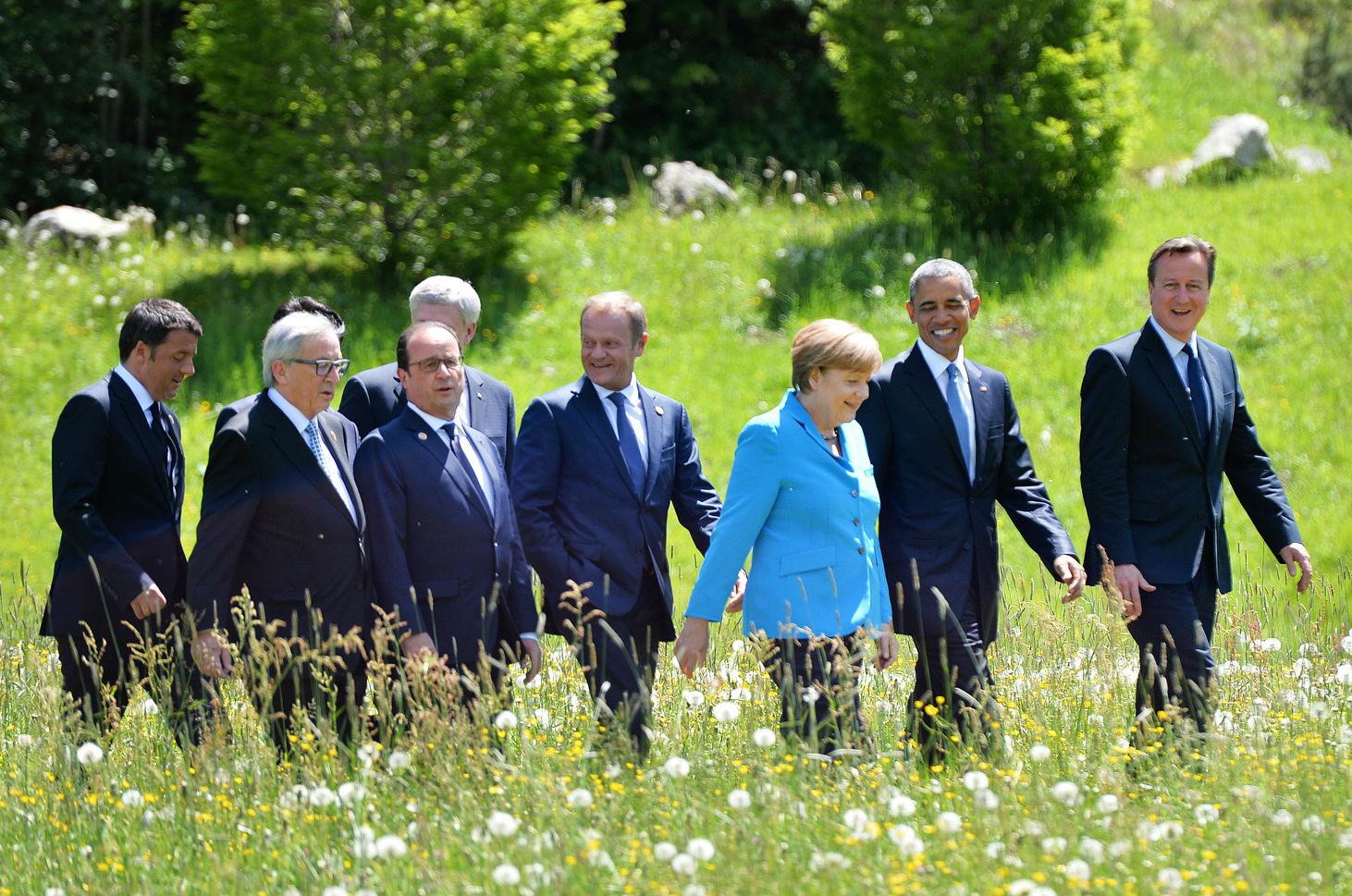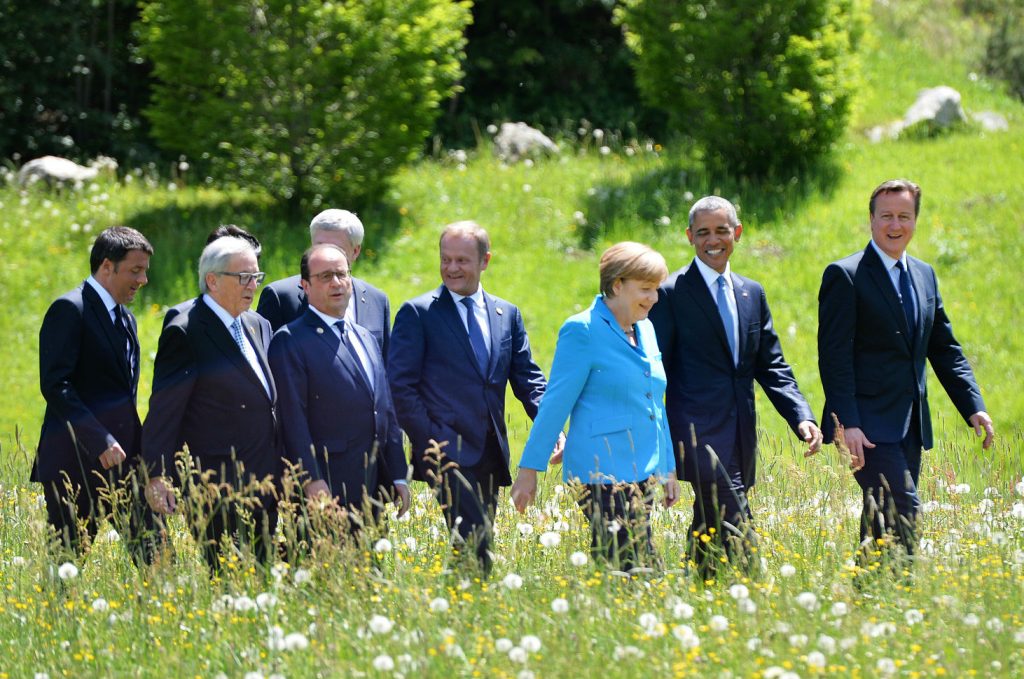 Leaders at the recent G-7 summit reaffirmed their commitment to keeping sanctions on Russia in place. They also agreed that sanctions will likely be extended until 2016 because Russia has failed to implement the Minsk II ceasefire agreement. But the summit ended on a disappointing note: The summit communiqué and all the G-7 leaders indicated that Russia’s observance of Minsk II would lead to reduced sanctions. Nevertheless, the G-7 communiqué highlights much of what is wrong with European security today.
Leaders at the recent G-7 summit reaffirmed their commitment to keeping sanctions on Russia in place. They also agreed that sanctions will likely be extended until 2016 because Russia has failed to implement the Minsk II ceasefire agreement. But the summit ended on a disappointing note: The summit communiqué and all the G-7 leaders indicated that Russia’s observance of Minsk II would lead to reduced sanctions. Nevertheless, the G-7 communiqué highlights much of what is wrong with European security today.
Sanctions have failed to move Putin, in spite of their growing impact on the Russian economy. Just before the summit, Russian forces resumed large-scale fighting. This suggests that Western leaders still cannot grasp that Russian President Vladimir Putin cannot retreat from Ukraine or admit to Russians that their sacrifices were in vain and retain his power. He will not even admit that Russian soldiers have died in Ukraine or been taken prisoner. The Western response isn’t helping, either. No Western government is systematically broadcasting the extent of those Russian soldiers who have died, were wounded, or captured in eastern Ukraine, or the economic burdens incurred. From Putin’s perspective, he has little to fear from such a pusillanimous response.
The West’s offer to reduce sanctions if Putin would observe the Minsk II agreement indicates its confusion over the conflict. Sanctions were not imposed because of Minsk II; sanctions were imposed because Russia invaded Crimea and the Donbas and then Russian-backed forces shot down Malaysian Airlines Flight 17. Russia’s failure to observe Minsk II should generate more sanctions and economic pressure. Sanctions should not be lifted until the cause for imposing them is addressed.
European governments cannot accept that war in Europe is no longer unthinkable, that the international order and European security are at risk, and that we risk losing the great achievement of 1989-91 that undergirds European security. Recent polling shows that majorities in France, Germany, Italy, and the United Kingdom oppose sending forces to rescue a NATO ally that is attacked. Europe’s inaction is giving Washington another excuse to do nothing. Washington has said that it cannot allow any gaps to emerge between it and Europe. One European diplomat told me that what we have is “unity to do nothing,” or in Winston Churchill’s words, we are all powerful for drift. Such cowardice only confirms Putin’s belief that the West is too weak to resist determined Russian pressure and that Russia, as Putin told United States Secretary of State John Kerry at Sochi, does not care about sanctions.
What then should the United States do? I have long advocated a comprehensive multi-dimensional approach that includes giving lethal arms and training to Ukraine, increasing US energy exports to Europe, helping Ukraine implement its reforms and sustaining it while it does, and increasing the US defense budget to deploy more conventional forces in the Baltic States and Poland. We should also induce the Europeans to pay their share of their defense and regenerate a strategic information policy with a reincarnated US Information Agency and revitalized Radio Free Europe/Radio Liberty and Voice of America. Even if the US does not provide Ukraine with weapons, it should facilitate Ukraine’s acquisition of weapons from a third party. But instead, the State Department has prioritized Iran, climate change, and Iraq. And, since the White House tightly controls the State Department’s message, we know President Barack Obama’s strategy and priorities. Neither the White House nor the State Department take the Russian threat with the requisite seriousness. It’s also a scandal that the new British government is cutting defense spending.
We should also increase sanctions and give them real bite. If we will not isolate Russia from the SWIFT system of international financial transfers, we should impose travel bans and sanctions on all the Russian ministers and deputy ministers, including Putin, who supported the invasion of Crimea, and on the Duma members who voted to illegally annex the peninsula. These sanctions would block them from the United States, prevent them from gaining access to their assets in Europe, and separate them from their considerable assets in the United States. We should not shy away from publicizing the assets of the Russian elite across the country, either. Not only would another round of sanctions strike at those responsible, it would drive home the risks they and their families incur by blindly following Putin. It would show Putin, too, that some of his assets are beyond his reach.
Sadly, none of these tough measures is happening. US policy provides no strategic or moral rational for action and confines itself to futile gestures and rhetoric. Rhetoric will not save Ukraine. Ukraine must save itself by its own exertions and then perhaps it will have saved Europe by its example.
Stephen Blank is a Senior Fellow at the American Foreign Policy Council.
Image: Leaders at the G-7 summit in Krün, Germany, on June 7, 2015, agreed to keep sanctions on Russia in place. But the West’s offer to reduce sanctions if Russian President Vladimir Putin would observe the Minsk II ceasefire agreement indicates its confusion over the conflict. Sanctions were imposed because Russia invaded Crimea and the Donbas and then Russian-backed forces shot down Malaysian Airlines Flight 17. Credit: Arron Hoare/Crown copyright/Creative Commons
